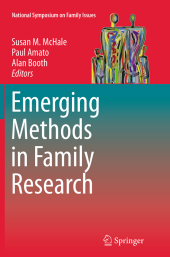 Neuerscheinungen 2016Stand: 2020-02-01 |
Schnellsuche
ISBN/Stichwort/Autor
|
Herderstraße 10
10625 Berlin
Tel.: 030 315 714 16
Fax 030 315 714 14
info@buchspektrum.de |

Paul Amato, Alan Booth, Susan M. McHale
(Beteiligte)
Emerging Methods in Family Research
Herausgegeben von McHale, Susan M.; Amato, Paul; Booth, Alan
Softcover reprint of the original 1st ed. 2014. 2016. xiv, 288 S. 26 SW-Abb., 20 Tabellen. 235 mm
Verlag/Jahr: SPRINGER, BERLIN; SPRINGER INTERNATIONAL PUBLISHING 2016
ISBN: 3-319-37692-6 (3319376926)
Neue ISBN: 978-3-319-37692-9 (9783319376929)
Preis und Lieferzeit: Bitte klicken
The family can be a model of loving support, a crucible of pathology, or some blend of the two. Across disciplines, it is also the basic unit for studying human relationships, patterns of behavior, and influence on individuals and society. As family structures evolve and challenge previous societal norms, new means are required for understanding their dynamics, and for improving family interventions and policies.
Emerging Methods in Family Research details innovative approaches designed to keep researchers apace with the diversity and complexities of today´s families. This versatile idea-book offers meaningful new ways to represent multiple forms of diversity in family structure and process, cutting-edge updates to family systems models and measurement methods, and guidance on the research process, from designing projects to analyzing findings. These chapters provide not only new frameworks for basic research on families, but also prime examples of their practical use in intervention and policy studies. Contributors also consider the similarities and differences between the study of individuals and the study of family relationships and systems. Included in the coverage:
Use of nonlinear dynamic models to study families as coordinated symbiotic systems.
Use of network models for understanding change and diversity in the formal structure of American families.
Representing trends and moment-to-moment variability in dyadic and family processes using state-space modeling techniques.
Why qualitative and ethnographic methods are essential for understanding family life.
Methods in multi-site trials of family-based interventions.
Implementing the Multiphase Optimization Strategy (MOST) to analyze the effects of family interventions.
Researchers in human development, family studies, clinical and developmental psychology, social psychology, sociology, anthropology, and social welfare as well as public policy researchers will welcome Emerging Methods in Family Research as a resource to inspire novel approaches to studying families.
I. Family Development and Change.- Latent Growth Curve Models with Random and Fixed Effects.- Families as Coordinated Symbiotic Systems: Making use of Nonlinear Dynamic Models.- Representing Trends and Moment-to-Moment Variability in Dyadic and Family Processes Using State-Space Modeling Techniques.- The Benefits and Challenges of Modeling Intra-Family Variability.- II. Family Systems.- Anatomies of Kinship: Preliminary Network Models for Change and Diversity in the Formal Structure of American Families.- Emerging Methods for Studying Families as Systems.- Families as Systems: Some Thoughts on Methods and Theory.- III. Approaches to Measuring Families.- Studying Family Transitions from a Systems Perspective: The Role of Biomarkers.- Ecological Momentary Assessment [EMA] in Family Research.- Why Qualitative and Ethnographic Methods are Essential for Understanding Family Life.- Approaches to Measuring Families.- IV. Family Programs and Policies.- Multiple Levels and Modalities of Measurement in a Population-Based Approach to Improving Parenting.- Multiple Comparisons and Truncation Bias in Family Policy Research: Strategies from the Building Strong Families Evaluation.- Optimizing Family Intervention Programs: The Multiphase Optimization Strategy (MOST).- Methods in Multi-site Trials of Family-based Interventions.- Capturing the Complexity of Families Using Innovative Methods.


